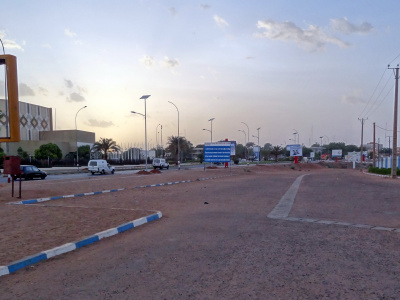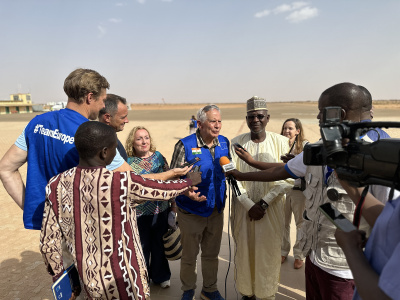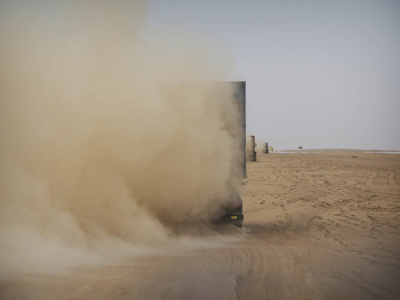
How the Sahel's democracy dream has turned into disillusionment
Over the past three years, Africa saw eight successful coups, raising concerns about the future of democracy, especially in the Sahel. Disillusioned with democracy often seen as a ‘Western value’, citizens seem to be turning to those who promise something better – a dangerous path when it comes to military governments. Instead, people in the Sahel should strive to deepen democratic principles and push for better implementation rather than expecting military takeovers to solve the failures of poor governance.
Why is the public disillusioned?
Growing insecurities along with a continuous dissatisfaction with democracy have contributed to the successful coups in Niger, Mali and Burkina Faso. All three are categorised as ‘weak states’ with some of the lowest human development scores. They show high levels of fragility, characterised by protracted violent conflict, extreme poverty and harsh climate change issues that contribute towards a multidimensional nature of never-ending crises such as massive displacements and long periods of food insecurity. The 'fall of Libya' and the resulting free flow of arms and armed groups in the region have amplified these issues.
Citizens have therefore seen many unfulfilled promises made by ‘democratically’ elected governments, leading to disillusionment with democracy and support for the military leaders. In Burkina Faso for instance, the 2022 ousting of president Roch Kaboré stemmed from the dissatisfaction among both civilians and the military. Central to this upheaval was the widespread perception of Kaboré's inability to tackle the escalating security crisis gripping the nation.
A similar unfolding of events happened in Mali in 2020. Against this backdrop of dissatisfaction and unrest, a military coup forcefully removed and detained Mali’s democratically elected leader Ibrahim Boubacar Keita, an act which was largely celebrated by the public.
There is a perception held by both citizens and military leaders that the partnership between 'democratically' elected leaders and Western allies is not just asymmetrical but also exploitative.
The discontent against these governments also extends to their external relations, mainly with Western powers. There is a perception held by both citizens and military leaders that the partnership between 'democratically' elected leaders and Western allies is not just asymmetrical but also exploitative.
For example, in Niger, president Mohamed Bazoum was dubbed the ‘puppet for the French’, as someone who easily gives in to their interests. France depends on Niger for 15% of its uranium imports for nuclear power generation. Yet, over the decades, the uranium exports have not boosted Niger’s economy and ironically, most Nigeriens still have no electricity. The country imports 70% of its electricity from Nigeria and the region where the uranium is exploited remains underdeveloped.
Such realities depict Western actors as enablers of the personal enrichment of these leaders who do so at the expense of national resources. Granted, that France has had one of the most complex and interventionist post-colonial relations with its former colonies. Coup leaders in the Sahel have therefore used such public sentiments to garner support from the public.
Moreso, with the current change of geopolitics in the Sahel region, disinformation, actively fuelled by Russia, also contributes towards creating the perception of the military’s success in the neighbouring countries.

The Lomé Peace and Security Forum – A mixture of voices
My attendance at the first edition of the Lomé Peace and Security Forum last year was an eye opener of the magnitude of grievances shared by people from the Sahel. While the theme of the forum was “How to strengthen political transitions towards democratic governance in Africa '', some panel discussions revolved around the 'suitability' of democracy to the 'African context', with leaders citing the mantra of ‘applying African solutions to African problems’.
Some of the participants argued that democracy is a concept derived from Western countries and may not be applicable to the African context where a lack of economic opportunities and lack of education for the average citizen hinder a genuine practice of the concept.
Not everyone was in agreement with this way of thinking. One of the speakers highlighted the need to apply the principles of democracy fully by strongly emphasising that “the idea that we have to take everything and turn it into an African point of view is not [...] the way forward.” This view is also supported by the latest Afrobarmeter survey – conducted in 36 countries during 2021/2022. The survey highlighted that 66% of Africans support democratic governance and values over alternative forms such as autocratic/military rule. Nevertheless, only 38% of this survey expressed satisfaction with the way democracy functions in their countries, indicating a big inadequacy of democratic governance amongst African countries and the public’s softening stance towards military governance.
The growing appeal of military rule in the Sahel region
Even though these grievances are legitimate, the idea that the military might be a better alternative is misguided. Military governments rarely perform better than civilian elected ones. By supporting military governments, citizens are therefore contributing to the suppression of their own democratic rights.
In most cases, the military leaders make themselves attractive to the public by ‘preaching’ pan-African ideas. For example, Burkina Faso’s Junta leader Ibrahim Traore gained popularity for his pan-African-oriented statements. During his speech at the 2023 Russian-African summit, he urged African heads of state to cease being puppets of imperialists. He also emphasised the need for African leaders to ensure food self-sufficiency for their citizens, instead of being content with ‘free handouts’, such as the promised shipment of free grain from Russia to Africa.
The invocation of pan-Africanism also played a role when Niger, Burkina Faso and Mali withdrew from ECOWAS. Junta leaders of these countries claimed that the regional body is “under the influence of foreign powers' and that it has "drifted from the ideals of its founding fathers and the spirit of pan-Africanism". If these declarations are formalised, their withdrawal from the regional body raises questions on how they will manage to substantially maintain their economic partnerships with their neighbours. All three countries are landlocked and a stop to the free movement of goods and people privileges they enjoy as members of ECOWAS may have negative consequences on the countries’ development.
Looking ahead
As liberating as it may appear, the seemingly appealing anti-imperialist rhetoric of junta leaders needs to be scrutinised. It is very questionable whether military leaders in these three countries, despite promoting pan-African ideas, have the capacity to rebuild state institutions, especially in the face of multi-dimensional challenges they are supposed to solve, and the rapidly worsening security situation.
For instance, military juntas in countries such as Mali have not yet fulfilled their promises of leading their countries through a transition to civilian rule as elections scheduled for February 2024 have once again been postponed. Relatedly, in Burkina Faso, Ibrahim Traore had initially agreed to hold elections in July 2024. But he later claimed to shift his focus towards addressing the dire security situation, over a timely transition to civilian rule.
For all the critique on the (in)compatibility of democracy to the 'African context' and the largely well-founded disaffection to civilian rule, the problem is not democracy per se but the inability to exercise a better and stronger democratic culture that ensures good governance. While holding multi-party elections that are free and fairer is an aspect of practising democracy, this cannot be its sole evidence. Therefore, citizens ought to actively ask for better governance and push their elected leaders to address the fundamental issues that erode transparent and efficient governance, rather than merely accepting the words of corrupt civilian or military leaders at face value. At the end of the day, only through accountable governance could the discontents of citizens be gradually alleviated.
The views are those of the authors and not necessarily those of ECDPM.





